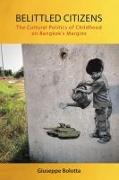- Start
- Belittled Citizens: The Cultural Politics of Childhood on Bangkok's Margins
Belittled Citizens: The Cultural Politics of Childhood on Bangkok's Margins
Angebote / Angebote:
What does childhood mean in contemporary Thailand? What constitutes childhood in a slum? How does childhood figure in the construction of national citizenships? Rich in ethnographic detail, this fascinating, engaging and illuminating study explores the daily lives, constraints, and social worlds of children born in the slums of Bangkok, and their ways of defining themselves in relation to a range of governing technologies, state and non-state actors, and broad cultural politics. It does so by interrogating the layered meanings of "childhood" in slums, schools, Buddhist temples, Christian NGOs, state and international aid organisations, as well as social media. Giuseppe Bolotta's analysis employs "childhood" as a prism to make sense of broader socio-political, religious, and economic transformations in Thai society. By examining the competition between different Thai and foreign actors to define and control the world-view formed by these children, he demonstrates how Bangkok slums are political arenas within which local, national and global social forces and interests converge and clash. At the same time, this analysis highlights the roles played by Bangkok's poor children in processes of social change, considering how young people's efforts to make sense of themselves in an era of authoritarian rule reflect the broader tensions facing the urban poor in this complex moment of Thai history. The book shows how "marginal childhoods" and the "cultural technologies of childhood" - schools, religious agencies, NGOs - reflect both endemic inequalities in Thailand's larger socio-political structure and global transformations in transnational childhood governance. Marginalized young people's increasingly plural cultural references create space for both existential fragmentation and creative self-reformulation, which provide socially disadvantaged citizens with unexpected religious, economic, and political resources to challenge Thai society's generational structures of power. Through these arguments, Belittled Citizens demonstrates that "childhood" is best understood in Thailand as a political category that has been fundamental to the military state's rule and, potentially, its undoing. It also shows more broadly how attention to children, typically excluded from national politics and therefore invisible in most political analyses, has important potential for producing startling insights into contemporary Southeast Asian societies.
Folgt in ca. 15 Arbeitstagen
